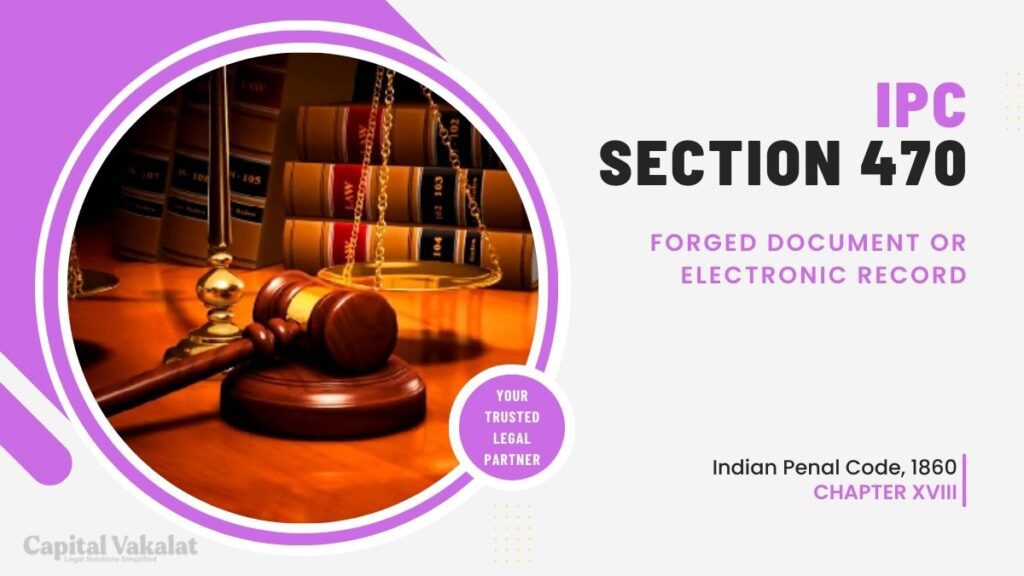In the intricate web of legal statutes, Section 470 IPC stands as a stalwart guardian against the malevolent acts of forgery, be it in the traditional realm of physical documents or the modern landscape of electronic records. This article aims to unravel the layers of Section 470 IPC, examining its provisions, legal ramifications, and the evolving challenges in a digital era.

Understanding Section 470 IPC begins with acknowledging its pivotal role in curbing the creation and use of forged documents or electronic records. In essence, it encapsulates the legal framework that governs the consequences of manipulating information with the intent to deceive.
Understanding Section 470 IPC
Legal Provisions and Scope
Section 470 IPC meticulously outlines the definition and penalties associated with forging documents or electronic records. Its comprehensive scope encompasses a wide array of fraudulent activities, from the conventional alteration of paper documents to the more sophisticated manipulation of digital data.
Distinction Between Forged Documents and Electronic Records
While the core essence of forgery remains consistent, the legal landscape draws a line between forged documents and electronic records. This demarcation is crucial for a nuanced interpretation of the law and for tailoring legal consequences to the nature of the offense.
Types of Forgeries Covered
Traditional Document Forgery
Classic forgery involves altering or fabricating physical documents such as contracts, wills, or certificates. Section 470 IPC serves as a deterrent against these deceptive practices, recognizing the potential harm caused by tampering with tangible evidence.
Challenges in Electronic Record Forgery
The digital age presents a new frontier for forgers, who exploit vulnerabilities in electronic systems. Section 470 IPC adapts to this reality by encompassing offenses related to electronic records, acknowledging the need for legal measures in the face of technological advancements.
Legal Ramifications
Penalties for Violating Section 470 IPC
The legal consequences for forging documents or electronic records under Section 470 IPC are severe, including imprisonment and fines. Examining notable cases provides insight into the gravity of these penalties, emphasizing the commitment to upholding the integrity of information.
Case Studies Illustrating Legal Consequences
Real-world examples underscore the tangible impact of Section 470 IPC. From fraudulent financial transactions to falsified academic credentials, these cases illuminate the necessity of stringent legal measures to maintain societal trust.
Key Elements of Proof
Establishing the Intent to Forge
Proving intent is paramount in cases involving Section 470 IPC. Legal proceedings hinge on establishing that the accused knowingly and willfully engaged in forging documents or electronic records. This requirement ensures that inadvertent errors are distinguished from deliberate acts of deception.
Role of Expert Testimony in Electronic Record Cases
The complexity of electronic record forgery often necessitates expert testimony. Cybersecurity experts and digital forensics professionals play a crucial role in providing technical insights, bridging the gap between legal interpretation and the intricacies of digital manipulation.
Evolving Nature of Forgery in the Digital Age
Technological Advancements and Challenges for Law Enforcement
As technology evolves, so do the methods employed by forgers. Section 470 IPC acknowledges the challenges posed by emerging technologies and underscores the importance of an agile legal system capable of adapting to the ever-changing landscape of digital deception.
Cybersecurity Measures to Combat Electronic Record Forgery
Prevention is key in the digital realm. Implementing robust cybersecurity measures not only protects individuals and businesses but also fortifies the legal framework by reducing the prevalence of electronic record forgery.
Recent Legal Developments
Amendments and Their Impact on Section 470 IPC
To stay relevant, legal frameworks must adapt. Recent amendments to Section 470 IPC reflect a proactive approach to addressing contemporary challenges, ensuring that the law evolves in tandem with technological advancements.
Adaptation to Address Emerging Trends in Forgery
The legal system must anticipate and respond to emerging trends in forgery. From deepfakes to blockchain-based fraud, Section 470 IPC must continuously evolve to maintain its efficacy in safeguarding truth and authenticity.
Preventive Measures for Individuals and Businesses
Document Verification Techniques
Vigilance is the first line of defense. Individuals and businesses can employ various document verification techniques to ensure the authenticity of information, mitigating the risk of falling victim to forged documents.
Secure Practices in Handling Electronic Records
In an era dominated by digital transactions, implementing secure practices is crucial. Encrypting sensitive information, regularly updating cybersecurity protocols, and fostering a culture of digital responsibility contribute to a resilient defense against electronic record forgery.
Challenges in Prosecution
Gathering Evidence in Electronic Record Cases
Electronic record forgery cases present unique challenges in gathering evidence. Section 470 IPC demands a nuanced approach, combining legal acumen with technological expertise to ensure a comprehensive case against the accused.
Cross-Border Implications and Jurisdiction Challenges
As electronic records transcend geographical boundaries, cross-border implications add a layer of complexity to prosecution. Addressing jurisdictional challenges becomes imperative to ensure a seamless legal process.
Conclusion
In conclusion, Section 470 IPC emerges as a bulwark against the erosion of trust stemming from forged documents or electronic records. Its adaptability to the digital age and commitment to legal consequences underscore its significance in preserving the sanctity of information.
Frequently Asked Questions
What distinguishes forgery from unintentional errors in documents or electronic records?
Intent plays a crucial role. Section 470 IPC requires proof that the accused knowingly and willfully engaged in deceptive practices.
How can individuals and businesses protect themselves from document forgery?
Implementing document verification techniques and secure practices in handling electronic records are vital preventive measures.
Are there recent legal developments addressing electronic record forgery?
Yes, recent amendments to Section 470 IPC reflect a proactive stance in adapting to emerging trends in forgery.
What role do experts play in cases involving electronic record forgery under Section 470 IPC?
Cybersecurity experts and digital forensics professionals provide crucial testimony, bridging the technical gap in legal proceedings.